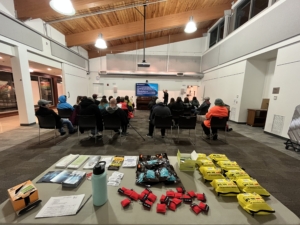Lebanon Library Partners for Opioid Overdose Prevention
This article first appeared in the Lebanon Times, Winter/Spring 2023 edition (www.thelebanontimes.com). Reprinted with permission.
Opioid Overdose Prevention partnership between Dartmouth-Health and Lebanon Public Libraries, By Charlotte Atkinson
Here in the Upper Valley, we are very lucky to have access to a wide range of resources, especially those that are found in unexpected places. The Lebanon Libraries are of course known for the literary resources that they offer, but now, the library has also become a destination for those who are most in need within our community.
A partnership between Dartmouth Health and Lebanon Public Libraries transpired from a direct need that the library staff found themselves facing on three separate occasions, during which a series of drug overdoses occurred outside of the library building. Both libraries—Lebanon Library and Kilton Library—are located near a frequently used Advanced Transit bus stop, so when these incidents arose, library staff didn’t know how to best handle the situation in this public setting.
Library Staff Trained on Overdose Response
Lauren Chambers, the senior community health partnership coordinator for Dartmouth Health, stepped in to train library staff firsthand on how to respond to a drug overdose situation. Chambers, who works with community partners to increase awareness of and access to substance use disorder services, puts a focus on care for affected individuals from prevention through recovery.
There were no fatalities during the incidents at the Lebanon Library, and EMTs and Lebanon Police were quickly on the scene, though one victim suffered a fatal overdose during a later incident. After the incidents, library director Amy Lappin prioritized giving library staff the opportunity to receive firsthand training from Chambers. Training included demonstrations for the administration of a life-saving medication, known as “Narcan”, in the form of a nasal spray. Once administered, Narcan does nothing to further harm the victim of a drug overdose.
The library staff welcomed the training, and Lappin emphasized that the Narcan administration process is surprisingly, “so simple!” Chambers has returned to the library twice for staff training sessions, and now Lebanon Public Libraries will provide regular opioid-overdose response training, available for both new and long-term staff.
Naloxboxes Provided to Libraries
Narcan, the brand name for the medication Naloxone, is commonly used to reverse or significantly reduce the effects of opioids on the human body. The effect of Narcan, which helps counter shallow breathing, is felt within roughly two minutes of its administration. The medication blocks the effects of opioids for up to 90 minutes, and multiple doses may be required afterward. Usually, the victim can be shocked and are not thinking rationally when they come back into consciousness.
In one instance that Lappin witnessed, a man who appeared dead and who was administered Narcan by EMTs simply got up from the scene and got on his bus, refusing further medical treatment. Now both libraries offer ‘Naloxboxes’ provided by Dartmouth Health, which provide the medication publicly and discreetly with no questions asked. Basic hygiene kits are also available, provided by UV Gear—another organization that supplies donation-based items like tents, deodorant, socks, wipes, and sleeping bags at no cost for the growing number of unhoused individuals in need within our community.
Naloxbox and Narcan provided to the Kilton Library by the HIV/HCV Resource Center. Naloxbox and Narcan provided to the Lebanon Library by Dartmouth Health. — Clarification from Lauren Chambers
“People are hurting…addiction is definitely an issue here,” Lappin said. “We want to help however we can. Libraries are about providing whatever resources our community needs and so we do that. There is just a huge need for a variety of things and we are trying to do our part to help people.” The library is now installing lockers on their facilities for access to essential supplies available 24/7, including access to a porta potty located outside of the building.
This program, with funding from the NH Dept. of Health and Human Services and Bureau of Drug and Alcohol Services (BDAS), provides vital resources for the community, helping to equip at risk or concerned individuals with critical tools that can save lives. “People can and do recover when they are connected with the appropriate care and resources and have a support network in place,” Chambers said. “By installing Naloxboxes in community spaces—visible to all—it sends the clear message that that community, business, or organization cares about its residents/patrons and feels strongly that providing access to this life-saving tool is critically important.”
“The drug epidemic is real, and people need help regardless of what somebody in the community thinks about that,” Lappin said. “Nobody wants to watch somebody die in front of them. The overdoses that the librarians and I had to witness, it’s a horrific thing to watch and it’s even more horrific to feel helpless in it.”
Lebanon Public Libraries and Dartmouth Health make it a point to be present as a resource for the community in ways that are needed the most. Whether checking out a library book, taking the bus, or accessing a life-saving tool such as Narcan, the libraries serve a variety of needs without our community, without a hint of judgement.







Leave a Reply
Want to join the discussion?Feel free to contribute!